________________
V. M. Kulkarni
19 brief, "pratibhā is that power whereby the poet sees the subjects of his poem as steeped in beauty and gives to his readers in appropriate language a vivid picture of the boa aty he has seen. It is a power whereby the poet not only calls up in his reader's heart the impressions of past experiences, but whereby also he presents ever new, wonderful and charming combinations and relations of things never before experienced or thought of by the plain or ordinary map. A poet is a seer who sees visions and possesses the additional gift of conveying to others less for tunate through the medium of language the visions he has or the dreams he dreams."'1
W. have dwelt on pratibhā for long for the simple reason that it is regarded if not universally, generally, as the sole cause of poetry. Whatever is touched by the magic wa ad-power of pratibhā becomes a-laukika, sui generis, unique; the world of Beauty, the poet's creation is altogether different and distinct from our everyday world. What renders the poet's creation unique is his pratibha. In other words, creative literature whose ball-mark is originality is the art of pratibhā (genius). And by extension we might as well say that like Creative Literature, Architecture, Sculpture, Painting, Music and Dancing are also the arts of pratibhā.
Pratibha is undoubtedly as already said, the sole cause of poetry but to appreciate this poetry you require a reader who is also gifted with pratibhā. Abhinavagupta recognises this affinity of nature between the poet and the reader of poetry wben he declares in the mangala sloka at the commencement of Locana :
सरस्वत्यास्तस्वं कवि-सहृदयाख्यं विजयते ।
“Victorious is the essence of speech called Kavi-sahrdaya, (the inevitable pair iavolved in all aesthetic activity) 'the poet, the artist and the dis. boraiaenjoyer, the critic' (it is equally possible to understand the com. pound Kavi-sahrdaya as meaning the creator-enjoyer, the poet, who himself is the disceraing reader)." It is on the basis of this affinity most probably that Bhatta Nayaka explains that appreciation of poetry is esse atially the same as the creation of it :
नायकस्य कवे: श्रोतुः समानोऽनुभवः ।।
of the pair, the word sahsda ya cannot be easily rendered in English. I literally means 'one of similar heart' 'one who is of the same heart', of like heart with the poet.' It may be taken to signify a person whose T Kane's 'History of Sauskrit Poetics’. (pp. 334–35)
Jain Education International
For Personal & Private Use Only
www.jainelibrary.org




